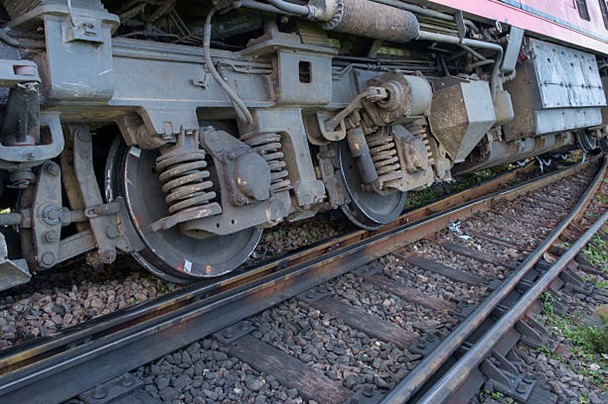
Train derailments can be catastrophic, causing severe injuries, loss of life, and extensive property damage. While train travel is generally safe, derailments still occur due to a variety of factors, from mechanical failures to human error. Understanding the most common causes of train derailments can help prevent future accidents and ensure accountability when negligence plays a role.
What Causes Train Derailments?
A train derailment happens when a train comes off its tracks, often leading to crashes, fires, and hazardous material spills. The Federal Railroad Administration (FRA) reports that derailments are responsible for millions of dollars in damages each year.
The Top Causes of Train Derailments
- Track Defects – One of the leading causes of derailments, broken rails, misaligned tracks, and switch failures can cause trains to jump off their tracks. Poor maintenance increases these risks.
- Mechanical Failures – Malfunctioning brakes, wheel defects, or issues with the locomotive engine can contribute to derailments. Routine inspections are critical to preventing mechanical breakdowns.
- Human Error – Train operators must follow strict speed limits, braking procedures, and track-switching protocols. Mistakes in operation or miscommunication between conductors and rail controllers can lead to derailments.
- Speeding – Excessive speed, especially around curves or in areas with poor track conditions, increases the likelihood of derailments. Many past derailments have been linked to trains traveling above recommended speeds.
- Obstructions on the Tracks – Fallen trees, vehicles at crossings, debris, and even animals on the tracks can force a train off its rails. Railroad companies must ensure tracks are clear and visible.
- Defective Train Components – Faulty couplings, axles, or wheel bearings can cause trains to separate or become unstable, leading to derailments. Manufacturing defects can also play a role.
- Poor Weather Conditions – Heavy rain, flooding, snow, and ice can weaken tracks, cause landslides, or reduce a train’s ability to brake effectively.
- Hazardous Cargo & Overloading – Trains carrying hazardous materials must follow strict safety regulations. Overloading or improperly securing cargo can shift weight distribution and throw a train off balance.
- Negligent Maintenance – Railroad companies are responsible for ensuring that tracks, signals, and train components are regularly inspected and maintained. Failure to do so can lead to preventable derailments.
- Bridge or Tunnel Failures – Structural weaknesses in bridges or tunnels can lead to catastrophic derailments, especially if inspections are not conducted regularly.
Who Is Liable in a Train Derailment?
Depending on the cause of the derailment, liability may fall on:
- Railroad companies for failing to maintain tracks and trains properly.
- Train operators for reckless or negligent driving.
- Manufacturers for producing defective train parts.
- Government agencies for inadequate track inspections and safety regulations.
What to Do If You’re Injured in a Train Derailment
- Seek medical attention immediately.
- Document the accident – Take photos and videos if possible.
- Gather witness information – Statements can be crucial for legal claims.
- Consult a train accident attorney – An experienced lawyer can help determine liability and pursue compensation for your injuries.
How Buckeye Law Group Can Help
Our legal team investigates train derailments, works with accident reconstruction experts, and fights for victims’ rights. If you or a loved one has been injured in a train accident, we are here to help.
Call 800-411-PAIN or complete our contact form for a free, no-obligation case consultation today.
How Railroad Accident Lawyers Help Victims After Train Collisions
Train and railroad accidents often result in catastrophic injuries, permanent disability, or even death. These crashes can involve passengers, pedestrians, motorists at crossings, or railroad employees. When such devastating harm
How Cosmetic Malpractice Lawyers Help Patients After a Botched Procedure
Cosmetic procedures are meant to enhance confidence and improve appearance, but when mistakes occur, the physical and emotional consequences can be devastating. Victims of substandard cosmetic care often face disfigurement,
Red Light Accident Lawyers Help Protect Your Rights After a Crash
Red light collisions often lead to serious injuries, significant vehicle damage, and complicated legal questions about fault and compensation. Knowing what to do in the aftermath can dramatically impact your
Dog Bite Injury Attorneys Help Victims Avoid Costly Claim Mistakes
Dog attacks can leave victims with serious injuries, emotional trauma, and unexpected medical expenses. What you do after a bite can directly impact your ability to recover compensation. Working with
Protecting Patients With an Attorney for Medication Errors at Buckeye Law Group
Why Working With an Attorney for Medication Errors Matters Medication errors can have serious consequences, from mild side effects to life-threatening complications. Mistakes can occur in hospitals, pharmacies, or even
How a Lawyer for Surgical Errors Can Help Patients After a Mistake
How a Lawyer for Surgical Errors Protects Your Rights at Buckeye Law Group Surgical errors can have serious, lasting effects on patients and their families. From complications during routine procedures
Recovering After an Uber or Lyft Accident With Rideshare Accident Lawyers
How Rideshare Accident Lawyers at Buckeye Law Group can Help Protect Your Rights Being injured in an Uber or Lyft accident can be overwhelming. Victims often face hospital bills, missed
Drunk Driver Accidents and How a Drunk Driver Accident Attorney Can Help You
How our Drunk Driver Accident Attorneys Can Help After a Serious Crash Drunk driving accidents can leave victims facing painful injuries, emotional distress, and sudden financial pressure. Medical bills, time
Key Challenges of Spinal Cord Injuries and Why Having a Skilled Malpractice Lawyer Matters
Spinal cord injuries caused by medical errors are devastating and complex. Victims face significant physical, emotional, and financial challenges. Having a skilled malpractice lawyer is crucial to navigating the legal
Brain Injuries from Medical Negligence: Understanding the Long-Term Effects and How a Malpractice Lawyer can Help You Today
Brain injuries caused by medical negligence can change a person’s life overnight. From cognitive challenges to emotional difficulties, the effects often extend far beyond the initial treatment. Victims need experienced
